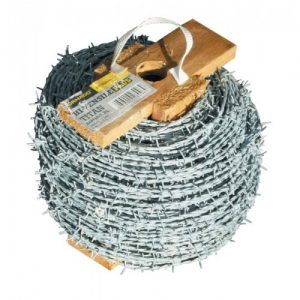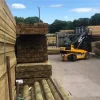High Tensile v Mild Steel
Throughout our website we mention high tensile and mild steel in relation to both nettings and barbed wires. We thought it might be a good idea to explain what we mean by these terms for those who might not know.
Typically fencing contractors and professionals will use high tensile, but why?
High tensile netting is ‘springy’ when unrolled, this makes it harder to initial install without protective gear and the correct fencing tools.
 Take a look at our Titan Hign Tensile barbed wire for an example. Tornado manufactures three specifications of barbed wire to suit various grades of use. High Tensile Titan barbed wire is manufactured from 2.0mm wire, High Tensile Standard barbed wire is produced from 1.6mm wire and mild steel barbed wire is manufactured from 2.5mm mild steel wire; the latter is generally used in conjunction with mild steel net fences.
Take a look at our Titan Hign Tensile barbed wire for an example. Tornado manufactures three specifications of barbed wire to suit various grades of use. High Tensile Titan barbed wire is manufactured from 2.0mm wire, High Tensile Standard barbed wire is produced from 1.6mm wire and mild steel barbed wire is manufactured from 2.5mm mild steel wire; the latter is generally used in conjunction with mild steel net fences.
The main reason contractors and professionals use high tensile is because once installed you can ‘pull’ high tensile netting harder mean the wire is tighter between the posts. The high tensile netting also crucial stays tighter for longer.
Why does high tensile wire stay tighter for longer?
High tensile netting contains more carbon than standard ‘mild’ steel. During its production it is treated to high levels of heat and then is ‘quenched’. This means after being heated it is quickly cooled. This process adds a lot of additional strength. High tensile netting generally has a yield strength of between 50,000 to 100,000 pounds per square inch. All of this additional strength is advantageous in producing a high quality strong reliable stock proof fence.
Why would you ever use mild steel then, I hear you ask?
Mild steel netting and barbed wire are still a huge proportion of our wire sales. This is because not everyone has the equipment to handle high tensile nor the requirements. Mild steel is often used around the farm. This is because to pull netting tight you usually require fencing clamps which can be expensive to purchase. Small holders and farms don’t tend to pull netting too hard therefore mild steel is the perfect choice for the. Mild steel is also perfect for anyone doing a short run of fencing or for patching up an existing fence.
So which should I use, high tensile or mild steel?
Depending on skill and some of the above circumstances the general rule is that if a professional contractor or an experienced fencer is putting the fence then high tensile would be our recommendation. If it’s your first time erecting netting or you are completing a short run or patching an old fence then we would usually recommend mild steel.
If you cannot make your mind up or need advice on any of our products then please call our sales team on 01538 753184 of email them on info@wburton.co.uk


